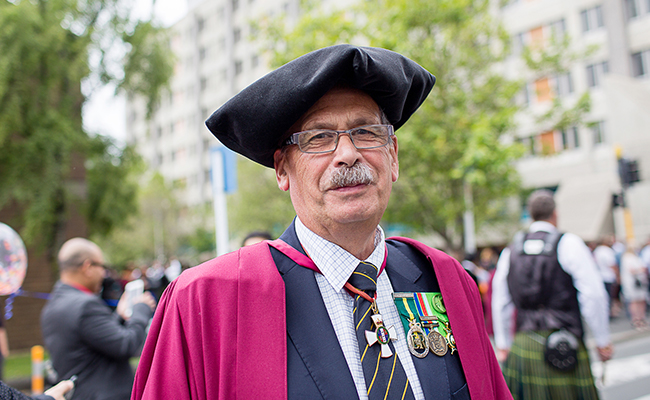
Emeritus Professor John Broughton retired on 30 June.
It is impossible for Emeritus Professor John Broughton to select his proudest achievement from his time at Otago; 47 years simply cannot be condensed to one moment.
An Otago graduate himself – he graduated with a Bachelor of Dental Surgery in 1977 – Professor Broughton went on to establish himself as an authority on Māori health.
He was a dental health surgeon from 1978, and a part-time clinical supervisor and guest lecturer in the medical school and dental school for 10 years until 1989, when he became a full staff academic staff member.
He retired on 30 June and has been awarded the title of Emeritus Professor.
His list of highlights includes establishing the Ngāi Tahu Māori Health Research Unit in the Department of Preventative and Social Medicine in 1996, which “allowed the team to undertake Māori health research projects”.
He is particularly proud of three publications that came out of the unit; UKAIPO - the stories of four generations of Māori women and childbirth, Puffing Up A Storm, and Injury to Māori, does it really have to be like this?, which was launched in the Great Hall of Parliament by three Ministers of the Crown.
He recalls the “incredible community support” he received for his role in introducing the Hauoroa Māori modules in the undergraduate medical curriculum, especially from “four very prominent Māori women, Christine Rimene, Connie Hassan, Christine Maxwell and Wendi Raumati”.
“I simply could not have done it without them, and I am to this day forever grateful.”
In 1990, Emeritus Professor Broughton was the driving force behind the establishment of the whānau dental clinic, Te Whare Kaitiaki, which he ran for more than 25 years.
“I am grateful to Professor Ferguson who gave me the clinical facilities and allowed me to run it utilising a kaupapa Māori approach.
“I am very proud of the fact that we got 90 per cent of the tamariki (children) from Te Kura Kaupapa Māori o Ōtepoti - the Māori immersion school – who chose to access our dental service, through to their secondary dentition without a filling in their mouths. And the majority were like that when they were 16 or 17 years of age.
“In the end we had people coming by the van load each week from Invercargill.”
The “ever increasing” number of Māori health students admitted to the health science courses, especially those in the Dental School, and the strength of Ngā Mokai O Ngā Whetu, the New Zealand Māori Dental Students Association, is high on his highlight list.
Emeritus Professor Broughton's impact can also be seen outside the Dental School; he is responsible for the University banner which is front and centre of every graduation ceremony.
“I am very proud of the fact that we got 90 per cent of the tamariki (children) from Te Kura Kaupapa Māori o Ōtepoti - the Māori immersion school - who chose to access our dental service, through to their secondary dentition without a filling in their mouths. And the majority were like that when they were 16 or 17 years of age."
“It came about because at one procession many years ago OUSA had made a banner from an old dirty, stained bed sheet and had written on it with spray paint – it looked absolutely terrible. So, I thought we could do better than that.
“It just so happened that at that time the NZ Embroiders Association was having a national conference here in Dunedin, so I contacted Jan Wilson and asked her to make a beautiful embroidery University banner; which she did.”
And, the Otago University Student Association Anzac services, established by former OUSA president Logan Edgar, also got off the ground with Emeritus Professor Broughton's support. He hasn't missed one ceremony since, including this year when the country was in COVID-19 lockdown.
“It was very important to acknowledge the 500 University students and 17 staff members who served in WWI and in particular the 97 who did not return,” he says of the services.
But, in his mind, his numerous awards, publications and achievements pale in significance to his students, and their achievements and it them he will miss the most, he says.
“It is definitely the students I will miss the most, especially Ngā Mokai O Ngā Whetu and the final year dental students for whom I run the paper … which is concerned with the five-week community service learning placement programme with Māori and Pacific oral health providers throughout the country and Tonga, Samoa and Fiji.”
While retirement will mean a different life, it will not necessarily be a quieter one; his days are well and truly filled with his role as secretary of the Otago University Rugby Club and the Otago Officers' Club, he is still helping out with the DENT 553 paper and will have plenty of duties to attend to at the Puketeraki and Araiteuru marae.
“And I'll have more time to attend to the garden and sit in the sun and read my book.”
This 47-year connection will not end with retirement.
“It is a great honour to be awarded the title of Emeritus and I'm humbled by it. I will still be here to support the University in any way I can as required – especially at our graduation ceremonies.”
Story by Lea Jones, Communications Adviser